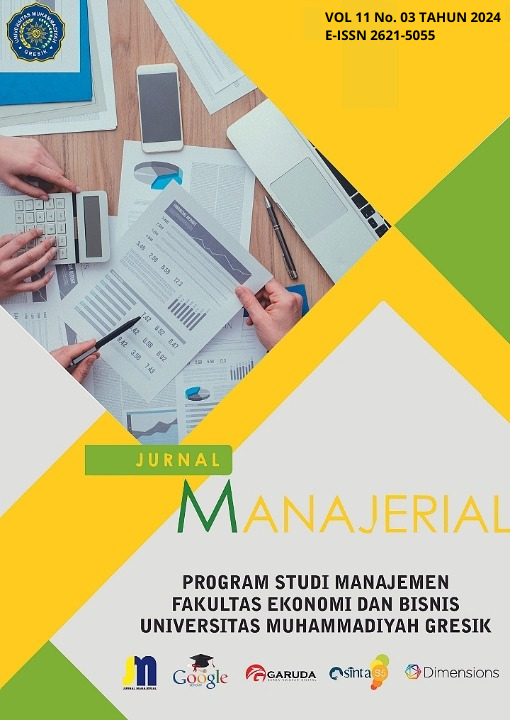Pengendalian Manajemen Sebagai Upaya Mengoptimalkan Kinerja Keuangan
DOI:
https://doi.org/10.30587/jurnalmanajerial.v11i03.8315Keywords:
Board of Directors, Independent Board of Directors, Board of Commissioners, External Pressure, Financial PerformanceAbstract
Background – The debt phenomenon is very crucial in the company. Many entrepreneurs go bankrupt or fail to pay due to debts owned by the company so that debt has a big pressure on generating company profits.
Aim – This research is to analyze the influence of corporate governance on financial performance and external pressure as mediating variables.
Design / methodology / approach – The cumulative method used to describe relationships in research and the analysis tool is Eviews.10 software. The sample used was 720 observation data from 144 financial sector companies for five years (2018-2022).
Findings – This shows that the board has a significant negative impact on external pressure. Independent directors and commissioners have a significant positive influence on external pressure. The board of directors has a significant positive influence on financial performance. Board independence has no effect on financial performance. Board and external pressures have a material negative impact on financial performance. External pressure indirectly has a negative and significant influence on financial performance among independent directors and commissioners. We also provide active and authoritative mediation between the board of directors and financial performance.
Conclusion – This needs to be taken into consideration that external pressure has a strong impact on independent directors and the board of commissioners so that the resulting performance will decrease, while the board of directors will have a strong impact on improving performance because the board of directors is able to control the pressure that arises from stakeholders.
Research implication – For manufacturing companies, they will be able to see which ones can provide an increase in company profits so that they will be able to maximize corporate governance in managing the company's finances.
Limitations – This research only uses one sector, namely manufacturing companies. This research needs to be expanded to different sectors.
References
Achmad, T., Ghozali, I. and Pamungkas, I.D. (2022) ‘Hexagon Fraud: Detection of Fraudulent Financial Reporting in State-Owned Enterprises Indonesia’, Economies, 10(1), pp. 1–16. Available at: https://doi.org/10.3390/economies10010013.
Agyei, J., Sun, S. and Abrokwah, E. (2020) ‘Trade-Off Theory Versus Pecking Order Theory: Ghanaian Evidence’, SAGE Open, 10(3), p. 215824402094098. Available at: https://doi.org/10.1177/2158244020940987.
Ahmad, N., Mobarek, A. and Raid, M. (2023) ‘Impact of global financial crisis on firm performance in UK: Moderating role of ESG, corporate governance and firm size’, Cogent Business and Management, 10(1). Available at: https://doi.org/10.1080/23311975.2023.2167548.
Ahmed, F. and Siddiqui, D.A. (2019) ‘Impact of Debt Financing on Performance: Evidence from Textile Sector of Pakistan’, SSRN Electronic Journal [Preprint]. Available at: https://doi.org/10.2139/ssrn.3384213.
Al-ahdal, W.M. et al. (2023) ‘Corporate Governance Practices and Firm Performance in Emerging Markets: Empirical Insights from India and Gulf Countries’, Vision, 27(4), pp. 526–537. Available at: https://doi.org/10.1177/09722629211025778.
Albrecht, W.S. et al. (1982) How to Detect and Prevent Business Fraud. Englewood Cliffs. New jersey: prentice-Hall.
Alghadi, M.Y., Alzyadat, A.A. and Mugableh, M.I. (2022) ‘The Effects Of Corporate Governance On Capital Structure: Evidence From Jordan’, Webology (ISSN: 1735 …, 19(2), pp. 8025–8038. Available at: https://www.webology.org/data-cms/articles/20220415110054pmwebology 19 (2) - 585 pdf.pdf.
Angelia, A. and Imelda, E. (2023) ‘Firm Size, Leverage and Corporate Governance Mediated Intellectual Capital on Firm Performance’, International Journal of Application on Economics and Business, 1(1), pp. 500–511. Available at: https://doi.org/10.24912/v1i1.500-511.
Arifin, A.H. (2023) ‘Firm Value Volatility in View of Profit Performance and Practices Good Corporate Governance’, SEIKO : Journal of Management & Business, 6(1), pp. 296–310.
Astami, E. et al. (2024) ‘Do family ownership and supervisory board characteristics influence audit report lag? A view from a two-tier board context’, Journal of International Accounting, Auditing and Taxation, 56(June), p. 100638. Available at: https://doi.org/10.1016/j.intaccaudtax.2024.100638.
Aulia Haqq, A.P.N. and Budiwitjaksono, G.S. (2020) ‘Analisa teori fraud pentagon sebagai pendeteksi kecurangan pada laporan keuangan’, Journal of Economics, Business, & Accountancy Ventura, 22(3), pp. 319–332. Available at: https://doi.org/10.14414/jebav.v22i3.1788.
Bazhair, A.H. (2023) ‘Board Governance Mechanisms and Capital Structure of Saudi Non-Financial Listed Firms: A Dynamic Panel Analysis’, SAGE Open, 13(2), p. 215824402311729. Available at: https://doi.org/10.1177/21582440231172959.
Berle, A.A. and Means, G.C. (1932) The Modern Corporation and Private Property. New York: The Macmillan Company.
Boshnak, H.A., Alsharif, M. and Alharthi, M. (2023) ‘Corporate governance mechanisms and firm performance in Saudi Arabia before and during the COVID-19 outbreak’, Cogent Business & Management, 10(1). Available at: https://doi.org/10.1080/23311975.2023.2195990.
Chaklader, B. and Padmapriya, B. (2021) ‘Impact of cash surplus on firm’s capital structure: validation of pecking order theory’, Managerial Finance, 47(12), pp. 1801–1816. Available at: https://doi.org/10.1108/MF-08-2020-0417.
Chams, N. and García-Blandón, J. (2019) ‘Sustainable or not sustainable? The role of the board of directors’, Journal of Cleaner Production, 226, pp. 1067–1081. Available at: https://doi.org/10.1016/j.jclepro.2019.04.118.
Cheliatsidou, A. et al. (2023) ‘The international fraud triangle’, Journal of Money Laundering Control, 26(1), pp. 106–132. Available at: https://doi.org/10.1108/JMLC-09-2021-0103.
Cressey, D. (1973) ‘Other People’s Money, Patterson Smith, Montclair.’, Other People’s Money, Patterson Smith, Montclair. [Preprint].
Cressey, D.R. (1950) ‘“The criminal violation of financial trust”,’ American Sociological Review, 15(6), pp. 738–743.
Cressey, D.R. (1953) A Study in the Social Psychology of Embezzlement: other People’s Money. The Free Press, Glencoe, IL.
Daily, C.M., Dalton, D.R. and Cannella, A.A. (2003) ‘Corporate Governance: Decades of Dialogue and Data’, The Academy of Management Review, 28(3), p. 371. Available at: https://doi.org/10.2307/30040727.
Dakua, S. (2019) ‘Effect of determinants on financial leverage in <scp>I</scp> ndian steel industry: <scp>A</scp> study on capital structure’, International Journal of Finance & Economics, 24(1), pp. 427–436. Available at: https://doi.org/10.1002/ijfe.1671.
Davis, J.H., Schoorman, F.D. and Donaldson, L. (1997) ‘Toward a Stewardship Theory of Management’, The Academy of Management Review, 22(1), p. 20. Available at: https://doi.org/10.2307/259223.
Dawood, M. et al. (2023) ‘Contribution the Effect of Corporate Governance on Firm Performance in Pakistan’, Review of Education, Administration & Law, 6(1), pp. 51–62. Available at: https://doi.org/10.47067/real.v6i1.304.
Devi, S., Warasniasih, N.M.S. and Masdiantini, P.R. (2020) ‘The Impact of COVID-19 Pandemic on the Financial Performance of Firms on the Indonesia Stock Exchange’, Journal of Economics, Business, & Accountancy Ventura, 23(2). Available at: https://doi.org/10.14414/jebav.v23i2.2313.
Donaldson, L. (1990) ‘The Ethereal Hand: Organizational Economics and Management Theory’, The Academy of Management Review, 15(3), p. 369. Available at: https://doi.org/10.2307/258013.
Dubey, R. et al. (2019) ‘Supplier relationship management for circular economy’, Management Decision, 57(4), pp. 767–790. Available at: https://doi.org/10.1108/MD-04-2018-0396.
Eisenhardt, K.M. (1989) ‘Agency Theory: An Assessment and Review’, The Academy of Management Review, 14(1), p. 57. Available at: https://doi.org/10.2307/258191.
Emmanuel, A.A., Esther, I.O. and Miracle, A.K. (2022) ‘Corporate Governance and Firm Performance: Evidence from the Deposit Money Banks in Nigeria’, AJMR 88 Amity Journal of Management Research ADMAA Amity Journal of Management Research, 5(1), pp. 1–19.
Fama, E.F. and Jensen, M.C. (1983) ‘Separation of Ownership and Control’, The Journal of Law and Economics, 26(2), pp. 301–325. Available at: https://doi.org/10.1086/467037.
Firmansyah, I. and Fadillah, A.R. (2019) ‘The Role of the Board of Commissioners in Improving the Financial Performance of Sharia Insurance Industries in Indonesia’, in Proceedings of the 2019 International Conference on Organizational Innovation (ICOI 2019). Paris, France: Atlantis Press, pp. 341–346. Available at: https://doi.org/10.2991/icoi-19.2019.58.
Forte, R. and Tavares, J.M. (2019) ‘The relationship between debt and a firm’s performance: the impact of institutional factors’, Managerial Finance, 45(9), pp. 1272–1291. Available at: https://doi.org/10.1108/MF-04-2018-0169.
Freeman, R.E. (2023a) Managing for stakeholders: Trade-offs or value creation. In R. Edward Freeman’s Selected Works on Stakeholder Theory and Business Ethics. Cham: Springer International Publishing.
Freeman, R.E. (2023b) The politics of stakeholder theory: Some future directions. In R. Edward Freeman’s Selected Works on Stakeholder Theory and Business Ethics. Cham: Springer International Publishing.
Freeman, R.E., Dmytriyev, S.D. and Phillips, R.A. (2021) ‘Stakeholder Theory and the Resource-Based View of the Firm’, Journal of Management, 47(7), pp. 1757–1770. Available at: https://doi.org/10.1177/0149206321993576.
Freudenreich, B., Lüdeke-Freund, F. and Schaltegger, S. (2020) ‘A Stakeholder Theory Perspective on Business Models: Value Creation for Sustainability’, Journal of Business Ethics, 166(1), pp. 3–18. Available at: https://doi.org/10.1007/s10551-019-04112-z.
Gati, V. et al. (2020) ‘Islamic index, independent commissioner and firm performance’, Cogent Business & Management. Edited by C.G. Ntim, 7(1), p. 1824440. Available at: https://doi.org/10.1080/23311975.2020.1824440.
Hafiza, N.S. et al. (2022) ‘Motives of Customer ’ S E -Loyalty Towards E-Banking Services : a Study in Pakistan’, 19(3).
Harrison, J.S. et al. (2019) The Cambridge handbook of stakeholder theory. (Eds). United Kingdom: Cambridge University Press.
Hasanuddin, R. et al. (2021) ‘The Effect of Firm Size, Debt, Current Ratio, and Investment Opportunity Set on Earnings Quality: An Empirical Study in Indonesia’, Journal of Asian Finance, Economics and Business, 8(March 2021), p. 2021. Available at: https://doi.org/10.13106/jafeb.2021.vol8.no6.0179.
Hashim, H.A. et al. (2020) ‘The risk of financial fraud: a management perspective’, Journal of Financial Crime, 27(4), pp. 1143–1159. Available at: https://doi.org/10.1108/JFC-04-2020-0062.
Hindasah, L. and Akmalia, A. (2023) ‘Can Corporate Governance Protect Firm Performance During The Covid-19 Pandemic?’, Quality - Access to Success, 24(192), pp. 174–182. Available at: https://doi.org/10.47750/QAS/24.192.20.
Hong, N.T.H. and Linh, T.K. (2023) ‘Institutional investors, corporate governance and firm performance in an emerging market: evidence from Vietnam’, Cogent Economics and Finance, 11(1). Available at: https://doi.org/10.1080/23322039.2022.2159735.
Islam, R., Haque, Z. and Moutushi, R.H. (2022) ‘Earnings quality and financial flexibility: A moderating role of corporate governance’, Cogent Business and Management, 9(1). Available at: https://doi.org/10.1080/23311975.2022.2097620.
Jansen, K. et al. (2023) ‘Financing decisions in private family firms: a family firm pecking order’, Small Business Economics, 61(2), pp. 495–515. Available at: https://doi.org/10.1007/s11187-022-00711-9.
Jensen, M. C., & Meckling, W.H. (1976) ‘Theory of the firm: Managerial behavior, agency costs and ownership structure’, Journal of Financial Economics, 3(4), pp. 305–360. Available at: https://doi.org/10.1016/0304-405X(76)90026-X.
Jensen, M. and Meckling, W. (1976) ‘Theory of the firm: Managerial behavior, agency cost, and ownership structure’, Journal of Financial Economics, 3(5), pp. 305–360. Available at: https://doi.org/https://doi.org/10.1016/0304- 405X7690026-X.
Jensen, M.C. and Smith, Jr., C.W. (2000) ‘Stockholder, Manager, and Creditor Interests: Applications of Agency Theory’, SSRN Electronic Journal [Preprint]. Available at: https://doi.org/10.2139/ssrn.173461.
Jesuka, D. and Peixoto, F.M. (2022) ‘Corporate governance and firm performance: does sovereign rating matter?’, Corporate Governance (Bingley), 22(2), pp. 243–256. Available at: https://doi.org/10.1108/CG-08-2020-0369.
Kagias, P. et al. (2022) ‘The fraud triangle – an alternative approach’, Journal of Financial Crime, 29(3), pp. 908–924. Available at: https://doi.org/10.1108/JFC-07-2021-0159.
Kao, M.-F., Hodgkinson, L. and Jaafar, A. (2019) ‘Ownership structure, board of directors and firm performance: evidence from Taiwan’, Corporate Governance: The International Journal of Business in Society, 19(1), pp. 189–216. Available at: https://doi.org/10.1108/CG-04-2018-0144.
Khoe, J.P., Sutejo, B.S. and Murhadi, W.R. (2024) ‘Corporate Governance of Firm Performance in the Non-Financial Sector for the 2017–2021 Period’, in. Atlantis Press International BV, pp. 93–98. Available at: https://doi.org/10.2991/978-94-6463-244-6_17.
Kijkasiwat, P., Hussain, A. and Mumtaz, A. (2022) ‘Corporate Governance, Firm Performance and Financial Leverage across Developed and Emerging Economies’, Risks, 10(10), p. 185. Available at: https://doi.org/10.3390/risks10100185.
Kok, W.-C., Lau, W.-Y. and Yip, T.-M. (2023) ‘Nexus between Financial Leverage and Board Independence of Public-Listed Firms: Is There Any Stylised Fact?’, Journal of Indonesian Economy and Business, 38(1), pp. 81–91. Available at: https://doi.org/10.22146/jieb.v38i1.4096.
Kozhan, R. (2010) Financial Econometrics Wth Eviews. Roman Kozhan & Ventus Publishing ApS.
Kyere, M. and Ausloos, M. (2021) ‘Corporate governance and firms financial performance in the United Kingdom’, International Journal of Finance & Economics, 26(2), pp. 1871–1885. Available at: https://doi.org/10.1002/ijfe.1883.
Letdin, M. et al. (2019) ‘Peer Benchmarking Tax Avoidance for Cost of Debt’, SSRN Electronic Journal, pp. 1–44. Available at: https://doi.org/10.2139/ssrn.3460713.
Lu, J.-H. and Lai, Y. (2023) ‘Corporate Governance Rating and Firm Performance: Evidence from Taiwan’, Finance & Management Strategy, 18(1), pp. 163–204.
Mahmood, Z., Khan, K.M. and Mahmood, Z. (2023) ‘Impact of corporate governance on firm performance: a case of Pakistan stock exchange’, Liberal Arts and Social Sciences International Journal (LASSIJ), 7(1), pp. 24–38. Available at: https://doi.org/10.47264/idea.lassij/7.1.2.
Mansour, M. et al. (2023) ‘A review of the influence of capital structure on the relationship between corporate governance and firm performance’, International Journal of Procurement Management, 17(1), pp. 79–105. Available at: https://doi.org/10.1504/IJPM.2023.130269.
Manu, R.E.H.R. et al. (2019) ‘The Effect of Corporate Governance on Profitability, Capital Structure and Corporate Value’, Research Journal of Finance and Accounting, 10(8), pp. 202–214. Available at: https://doi.org/10.7176/RJFA.
Martinez, L.B., Scherger, V. and Guercio, M.B. (2019) ‘SMEs capital structure: trade-off or pecking order theory: a systematic review’, Journal of Small Business and Enterprise Development, 26(1), pp. 105–132. Available at: https://doi.org/10.1108/JSBED-12-2017-0387.
Memon, Z.Al., Chen, Y. and Samo, A.A. (2019) ‘Corporate Governance, Firm Age, and Leverage: Empirical Evidence from China’, Research Journal of Finance and Accounting, 10(2), pp. 19–31. Available at: https://doi.org/10.7176/RJFA.
Merendino, A. and Melville, R. (2019) ‘The board of directors and firm performance: empirical evidence from listed companies’, Corporate Governance: The International Journal of Business in Society, 19(3), pp. 508–551. Available at: https://doi.org/10.1108/CG-06-2018-0211.
Mohammed, N. (2018) ‘Board Characteristics And Firm Performance: Empirical Evidence From Turkey’, The Journal of The University of Duhok, 21(1), pp. 423–430. Available at: https://doi.org/10.26682/hjuod.2018.21.1.23.
Muharam, H. and Atyanta, N.L. (2021) ‘The Effect of Corporate Governance on Firm Performance’, Indicators : Journal of Economic and Business, 3(2), pp. 132–142. Available at: https://doi.org/10.47729/indicators.v3i2.93.
Naciti, V. (2019) ‘Corporate governance and board of directors: The effect of a board composition on firm sustainability performance’, Journal of Cleaner Production, 237, p. 117727. Available at: https://doi.org/10.1016/j.jclepro.2019.117727.
Najamuddin, Y. et al. (2022) ‘Corporate governance mechanism and profitability’, International Journal of Research in Business and Social Science (2147- 4478), 11(4), pp. 239–245. Available at: https://doi.org/10.20525/ijrbs.v11i4.1773.
Napitupulu, I.H. et al. (2023) ‘Optimizing good Corporate Governance Mechanism to Improve Performance: Case in Indonesia’s Manufacturing Companies’, Global Business Review, 24(6), pp. 1205–1226. Available at: https://doi.org/10.1177/0972150920919875.
Naranjo, P., Saavedra, D. and Verdi, R.S. (2022) ‘The Pecking Order and Financing Decisions: Evidence From Changes to Financial-Reporting Regulation’, Journal of Accounting, Auditing and Finance, 37(4), pp. 727–750. Available at: https://doi.org/10.1177/0148558X20945066.
Ngatno, Apriatni, E.P. and Youlianto, A. (2021) ‘Moderating effects of corporate governance mechanism on the relation between capital structure and firm performance’, Cogent Business & Management. Edited by C.G. Ntim, 8(1). Available at: https://doi.org/10.1080/23311975.2020.1866822.
Nicholson, G.J. and Kiel, G.C. (2007) ‘Can Directors Impact Performance? A case‐based test of three theories of corporate governance’, Corporate Governance: An International Review, 15(4), pp. 585–608. Available at: https://doi.org/10.1111/j.1467-8683.2007.00590.x.
Olawale, A. and Obinna, E. (2023) ‘Corporate Governance, Institutional Quality, and Firm Performance: A Comprehensive Analysis of the Oil & Gas Sector’, Journal of Finance and Economics, 11(3), pp. 160–170. Available at: https://doi.org/10.12691/jfe-11-3-4.
Orji, A. and O, N.E. (2021) ‘Effect of Debt Financing on Firms Performance in Nigeria’, Journal of Accounting and Financial Management E, 7(3), pp. 60–72. Available at: www.iiardjournals.org.
Owusu, G.M.Y. et al. (2022) ‘Examining the predictors of fraud in state-owned enterprises: an application of the fraud triangle theory’, Journal of Money Laundering Control, 25(2), pp. 427–444. Available at: https://doi.org/10.1108/JMLC-05-2021-0053.
Ozcelik, H. (2020) ‘An Analysis of Fraudulent Financial Reporting Using the Fraud Diamond Theory Perspective: An Empirical Study on the Manufacturing Sector Companies Listed on the Borsa Istanbul’, in Contemporary Issues in Audit Management and Forensic Accounting & Contemporary Studies in Economic and Financial Analysis, pp. 131–153. Available at: https://doi.org/10.1108/S1569-375920200000102012.
Pamungkas, I.D. et al. (2022) ‘Corporate Governance and Financial Performance on Firm Value: The Case of Indonesia’, Wseas Transactions On Business And Economics, 20, pp. 92–103. Available at: https://doi.org/10.37394/23207.2023.20.10.
PeiZhi, W. and Ramzan, M. (2020) ‘Do corporate governance structure and capital structure matter for the performance of the firms? An empirical testing with the contemplation of outliers’, PLOS ONE. Edited by S.C. Gherghina, 15(2), p. e0229157. Available at: https://doi.org/10.1371/journal.pone.0229157.
Pham, H.S.T. and Nguyen, D.T. (2019) ‘The effects of corporate governance mechanisms on the financial leverage–profitability relation’, Management Research Review, 43(4), pp. 387–409. Available at: https://doi.org/10.1108/MRR-03-2019-0136.
Putra, A.A. (2023) ‘Managerial ability and informative earnings management: the role of CEO-commissioner relationship and board independence’, Corporate Governance: The International Journal of Business in Society, 23(4), pp. 742–765. Available at: https://doi.org/10.1108/CG-02-2022-0067.
Qu, W. and Zhang, J. (2023) ‘Environmental, Social, and Corporate Governance (ESG), Life Cycle, and Firm Performance: Evidence from China’, Sustainability, 15(18), p. 14011. Available at: https://doi.org/10.3390/su151814011.
Ramadhan, M.A. and Firmansyah, A. (2022) ‘The Supervision Role of Independent Commissioner in Decreasing Risk From Earnings Management and Debt Policy’, Accounting Analysis Journal, 11(1), pp. 31–43. Available at: https://doi.org/10.15294/aaj.v11i1.58178.
Ramli, N.A., Latan, H. and Solovida, G.T. (2019) ‘Determinants of capital structure and firm financial performance—A PLS-SEM approach: Evidence from Malaysia and Indonesia’, The Quarterly Review of Economics and Finance, 71, pp. 148–160. Available at: https://doi.org/10.1016/j.qref.2018.07.001.
Ramos, M. (2003) ‘Auditors’ Responsibility for Fraud Detection’, Journal of Accountancy, 195(1), pp. 28–36.
Rosenau, J.N. (2021) ‘Governance in the Twenty-First Century’, in Understanding Global Cooperation. Brill: BRILL, pp. 16–47. Available at: https://doi.org/10.1163/9789004462601_003.
Sahasranamam, S., Arya, B. and Sud, M. (2020) ‘Ownership structure and corporate social responsibility in an emerging market’, Asia Pacific Journal of Management, 37(4), pp. 1165–1192. Available at: https://doi.org/10.1007/s10490-019-09649-1.
Sahin, Y., Bulkan, S. and Duman, E. (2013) ‘A cost-sensitive decision tree approach for fraud detection’, Expert Systems with Applications, 40(15), pp. 5916–5923.
Sajiwo Tri Prakoso et al. (2022) ‘The Role Of Profitability In Mediating Capital Structure, And Firm Size On Firm Value Mediated By Profitability’, International Journal of Social Science, 1(5), pp. 809–816. Available at: https://doi.org/10.53625/ijss.v1i5.1326.
Santos, R.C. dos et al. (2019) ‘Foreign investors? The effects of the property structure and legal system as mechanisms of corporate governance in Brazilian regulated companies’, Corporate Governance: The International Journal of Business in Society, 19(5), pp. 1082–1116. Available at: https://doi.org/10.1108/CG-02-2019-0072.
Schaltegger, S., Hörisch, J. and Freeman, R.E. (2019) ‘Business Cases for Sustainability: A Stakeholder Theory Perspective’, Organization & Environment, 32(3), pp. 191–212. Available at: https://doi.org/10.1177/1086026617722882.
Shahid, C. et al. (2022) ‘Attitudes Of Undergraduates And Teachers Towards Evolving Autonomous Learning L2 In Higher Education’, Journal of Positive School Psychology, 6(11), pp. 527–544.
Shahzad, A. et al. (2022) ‘Investigating the Effects of Capital Structure and Corporate Governance on Firm Performance: An Analysis of the Sugar Industry’, Frontiers in Psychology, 13(June). Available at: https://doi.org/10.3389/fpsyg.2022.905808.
Shan, Y.G. (2019) ‘Managerial ownership, board independence and firm performance’, Accounting Research Journal, 32(2), pp. 203–220. Available at: https://doi.org/10.1108/ARJ-09-2017-0149.
Simatupang, H.J., Purwanti, L. and Mardiati, E. (2019) ‘Determinants of capital structures based on the Pecking Order Theory and Trade-off Theory’, Jurnal Keuangan dan Perbankan, 23(1). Available at: https://doi.org/10.26905/jkdp.v23i1.2579.
Skousen, C.J., Smith, K.R. and Wright, C.J. (2009) ‘Detecting and predicting financial statement fraud: The effectiveness of the fraud triangle and SAS No. 99.’, Corporate Governance and Firms Performance, 13, pp. 23–81.
Spence, M. (1973) ‘Job market signaling’, The Quarterly Journal of Economics, 87(3), pp. 355–374.
Spence, M. (2002) ‘Signaling in retrospect and the informational structure of markets’, American Economic Review, 92, pp. 434–459.
Startz, R. (2015) EViews illustrated for version 9, IHS Global Inc.
Sugiyono (2019) Metode Penelitian Kuantitatif. Bandung: Alfabeta.
Summers, S.L. and Sweeney, J.T. (1998) ‘Fraudulently misstated financial statements and insider trading: An empirical analysis’, The Accounting Review, 73(1), pp. 131–146.
Suryandari, N.N.A., Yuesti, A. and Suryawan, S. (2019) ‘Fraud Risk and Earnings Management’, Journal Of Management Policies And Practices, 7(1), pp. 43–51. Available at: https://doi.org/10.15640/jmpp.v7n1a4.
Sutherland, E.H. (1940) ‘“White-collar criminality”,’ American Sociological Review, 5(1), pp. 1–12.
Triani, N. and Tarmidi, D. (2019) ‘Firm Value: Impact of Investment Decisions, Funding Decisions and Dividend Policies’, International Journal of Academic Research in Accounting, 9(2), pp. 158–163. Available at: https://doi.org/10.6007/IJARAFMS/v9-i2/6107.
Triantafylli (2021) ‘An empirical evaluation of the impact of agency conflicts on the association 2022 Accepted’, Journal of Applied Accounting Research [Preprint].
Uddin, M.N., Khan, M.S.U. and Hosen, M. (2019) ‘Does Corporate Governance Influence Leverage Structure in Bangladesh?’, International Journal of Financial Studies, 7(3), p. 50. Available at: https://doi.org/10.3390/ijfs7030050.
Utomo, S.T. and Mawardi, W. (2023) ‘The Funding Burden in Detecting Financial Fraud’, Management Analysis Journal, 12(3), pp. 332–342. Available at: https://doi.org/10.15294/maj.v12i3.74405.
Verrecchia, R.E. (1983) ‘Discretionary Disclosure’, Journal of Accounting and Economics, 5, pp. 179–194.
Vogelvang, B. (2005) Theory and applications with EViews, Solutions. prentice-Hall. Available at: http://scholar.google.com/scholar?hl=en&btnG=Search&q=intitle:Econometrics:+Theory+and+Applications+with+EViews#0.
Wati, Y. et al. (2023) ‘Corporate Social Responsibility, Corporate Governance, Firm Size and Financial Performance of Companies in Indonesia’, Jurnal Ecogen, 6(2), p. 177. Available at: https://doi.org/10.24036/jmpe.v6i2.14707.
Wulandari, R. (2020) ‘The influence of the board of commissioners and audit committee on financial performance with the as a moderating variables’, Journal of Research in Business, Economics, and Education, 2(5), pp. 1144–1152. Available at: http://e-journal.stie-kusumanegara.ac.id/index.php/jrbee/article/view/171.
Yuli Soesetio, Dyah Arini Rudiningtyas and Aulia Claraning Sukmawati (2023) ‘Factors Affecting Firm Performance: Does Corporate Governance Implementation Matter?’, Adpebi International Journal of Multidisciplinary Sciences, 2(1), pp. 1–12. Available at: https://doi.org/10.54099/aijms.v2i1.487.
Zaid, M.A.A., Abuhijleh, S.T.F. and Pucheta‐Martínez, M.C. (2020) ‘Ownership structure, stakeholder engagement, and corporate social responsibility policies: The moderating effect of board independence’, Corporate Social Responsibility and Environmental Management, 27(3), pp. 1344–1360. Available at: https://doi.org/10.1002/csr.1888.
Zarefar, A. and Narsa, I.M. (2023) ‘Do corporate governance drive firm performance? Evidence from Indonesia’, Gestão & Produção, 30, pp. 1–17. Available at: https://doi.org/10.1590/1806-9649-2022v29e7322.
Zuberi, O. and Mzenzi, S.I. (2019) ‘Analysis of employee and management fraud in Tanzania’, Journal of Financial Crime, 26(2), pp. 412–431. Available at: https://doi.org/10.1108/JFC-01-2018-0012.
Zulfikar, R. et al. (2020) ‘Corporate Governance Compliance in Banking Industry: The Role of the Board’, Journal of Open Innovation: Technology, Market, and Complexity, 6(4), p. 137. Available at: https://doi.org/10.3390/joitmc6040137






























 P-ISSN: 2354-8592 __ E-ISSN: 2621-5055
P-ISSN: 2354-8592 __ E-ISSN: 2621-5055 
